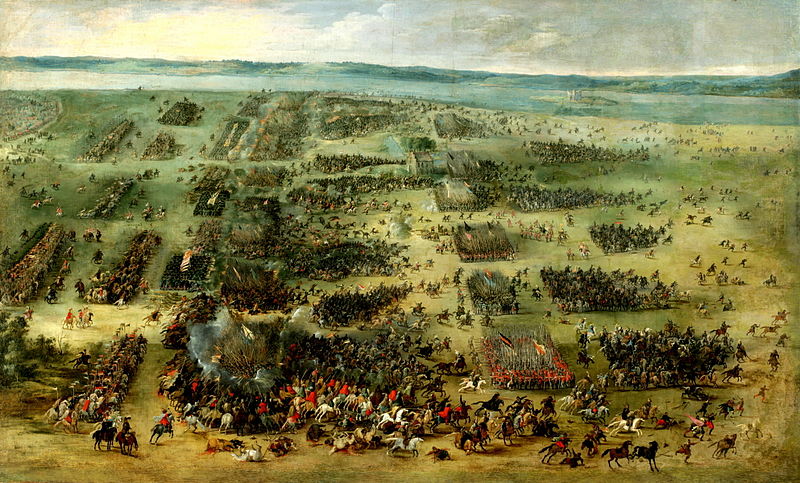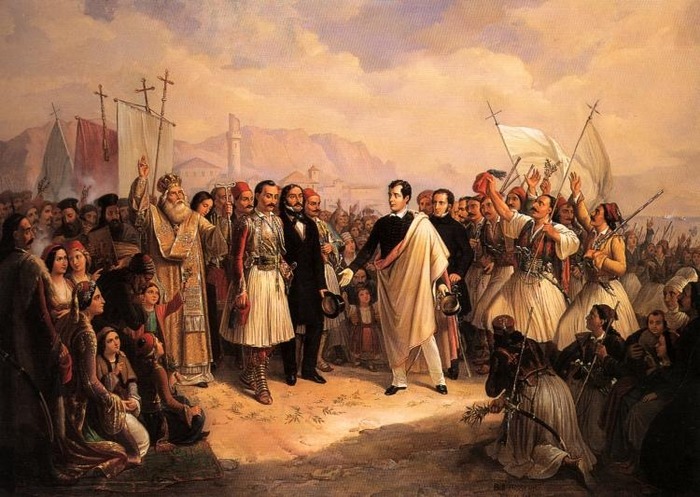018.
Waterloo. Lord Byron Poem. Appreciation By P S Remesh Chandran
Editor, Sahyadri Books & Bloom Books, Trivandrum
By PSRemeshChandra, 26th Apr 2011. Short URL http://nut.bz/3.ub8mva/
Posted in Wikinut Poetry
Political thought should be followed by political action.
Spoon and fork laid down to take musket and pistol.
The war of English and the French enters Belgium in the dead of night.
Heavy cannon fire shatters the sound of midnight revelry.
Youth and Pleasure chase the night with flying feet.
Midnight carnival turns into carnelian carnage.
Love or lust or wine, the Scottish soldiers are duty-bound.
Squadrons and chariots swiftly forming in ranks of war.
The Ardennes Great Woods shed tear drops over the unreturning brave.
Morning noon and night, and morning day again.
___________________________
Pictures Courtesy: Wikimedia Commons
http://bloombooks.webnode.com/
http://sahyadribooks.wordpress.com/
http://sahyadribookstrivandrum.yolasite.com
https://sites.google.com/site/keralacommentary/
https://sites.google.com/site/timeuponmywindowsill/
https://sites.google.com/site/sahyadribooksbloombooks/
https://sites.google.com/site/dogdocumentsinternational/english/
Waterloo. Lord Byron Poem. Appreciation By P S Remesh Chandran
Editor, Sahyadri Books & Bloom Books, Trivandrum
By PSRemeshChandra, 26th Apr 2011. Short URL http://nut.bz/3.ub8mva/
Posted in Wikinut Poetry
The maps of Europe were drawn and redrawn many times during the Eighteenth and the Nineteenth centuries. Countries became nations and empires which in no time were reverted back to nations and countries. It was not uncommon for people of those times to lay down spoons and forks in the dead of night and take muskets and pistols to brave war. Lord Byron in his famous poem portrays such a scene from the European arena.
Political thought should be followed by political action.
 |
| Byron in Albanian dress. |
George Gordon Noel Lord Byron was born in England in the Eighteenth century and lived through the Nineteenth century. He was a lame person and so he could not take part in the active moments of his nation. Because of this handicap, he possessed exceptional vigour, strength, courage and force at least in his writings. He believed that political thought should immediately be followed by political action. He had firm political opinions which could not be uttered in his century which naturally made him to turn himself into an irresistible revolutionary poet. His name stands brilliant and great among the star line of English poets. The Vision of Judgment, The Prisoner of Chillon and Childe Harold’s Pilgrimage are his most famous poems.
Spoon and fork laid down to take musket and pistol.
 |
| Vast Belgian halls where the rich and the famous assembled. |
Childe Harold means the child of Harrow University which was the poet himself. Childe Harold’s Pilgrimage is a long poem in which Byron describes his European travels. There are perhaps only two other famous poems of the like in English literature. They are Matthew Arnold’s ‘The Scholar Gypsy’ and William Wordsworth’s ‘Tintern Abbey Revisited’. These three constitute the University Trio in English poetry. Waterloo is a famous section from Childe Harold’s Pilgrimage.
The war of English and the French enters Belgium in the dead of night.
 |
| A ball in Brussels in 1815. |
In Belgium he attended a midnight ball of the rich and the famous in Brussels, the capital city. It was at that time that the French and English opened war which soon reached Belgium. The midnight revelry was broke down by cannon fire but instead of the expected chaos, Byron could not help but admire what he saw of the quickness with which the Scottish soldiers there responded to the sudden attack. Due to graphic descriptions of contradicting scenes before and after the outbreak of sudden war, this part of the poem became memorably fine and specially noted in the poem.
Heavy cannon fire shatters the sound of midnight revelry.
 |
| The battle in Brussels, formed in ranks of war. |
All the brave and beautiful in Brussels were assembled in that ball room in a large mansion to celebrate night. There were not less than a thousand people gathered in that vast hall. Lamps shone bright everywhere and soft music filled the atmosphere. It was not just opulence and extravaganza of the rich and powerful. Belgians thought and did everything great and magnificent. Electricity in the atmosphere could be touched by hand. Loving eyes exchanged glances. All went merry as a marriage bell until the deep sound of a cannon struck.
Youth and Pleasure chase the night with flying feet.
 |
| The Austro-Bavarian-French battery charge. |
In the midst of the revelry, most of them did not recognize it to be sound of French guns. Some said it was wind and some said it was chariot passing through the stony street. The midnight revelry continued. People had decided to sleep not till morn. Youth and Pleasure had decided to chase the night with flying feet. Personification of Pleasure here is delightful and apt, resembling Milton’s personification of Laughter in his University poem L’Allegro. The aristocrats, government officers, soldiers, students, lovers and lazy personages all reverted back to merriment and carnal festivity. Then the heavy sound was heard once again, this time nearer and louder. Now there was no doubt it was the opening roar of cannons.
Midnight carnival turns into carnelian carnage.
 |
| The Scotts riding to battle. |
The noble Duke of Brunswick was sitting in a niche in the festivity hall, passively nursing his drinks. He was fighting on the part of the English and had anger towards the French for taking away his power and authority. He was a soldier head to heel, was always alert and was the first to recognize the sound as a cannon’s roar. When he said it and said it was near, the others laughed. But he knew the sound too well which had stretched his father, a great Chieftain, on a bed of blood years ago. His desire for long awaited vengeance was immediately roused; he rushed into the field outside and fell fighting foremost as a hero. The Duke of Brunswick’s reaction to the sound of cannon heard in the distance was a forewarning to the massacre and carnelian carnage that was to follow. War was at their door step. Byron’s description of the reverberating din of merriment in the hall and the heart-rending rush to his death by the Duke of Brunswick are equally classical.
Love or lust or wine, the Scottish soldiers are duty-bound.
 |
| Lord Byron abroad. His reception at Missolonghi. |
It is interesting to note how this sudden crisis affected the Scottish soldiers present. Death of the Duke of Brunswick confirmed that it was not a joke but actual war. No one had thought such awful a morn could rise upon such sweet a night. Dancing stopped and partners parted. Some wept, some trembled, some sighed and all were pale. Many doubted whether they would ever meet again. The civilians all were dumb struck and silent, but the Scottish soldiers in the assembling were the first to recover. Love or lust or wine, they proved once more that they were duty-bound.
Squadrons and chariots swiftly forming in ranks of war.
 |
| Re-enactment of the Battle of Waterloo of 1815 for a film. |
They soon began to prepare for the war. There were hurried movements everywhere. Horses were quickly mounted; squadrons and chariots rode out with impetuous speed and all swiftly formed in ranks of war. Horns and trumpets were sounded which roused all soldiers into action. Famous Scottish war songs trumpeted through Scottish bagpipes resounded through the columns and ranks of the armies and thrilled even the enemies. The famous song, ‘Cameron’s Gathering’ rose high and wild and echoing through the Albion’s Hills, and reached the Anglo-Saxons as well as the French. In no time the soldiers were marching away to the battle field.
The Ardennes Great Woods shed tear drops over the unreturning brave.
 |
| The Ardennes Great Woods shed tears over the unreturning brave. |
Byron stood apart and watched the soldiers marching away to Waterloo. This last part of this portion of the poem is his reflections on the soldiers marching away to their death and glory. It is not possible that many of them may return alive to their land. As the English army marched away through the Ardennes Great Woods, trees waved their branches and shed tear drops over the unreturning brave. It was nature’s send-off and lamentation for her dearest of sons.
Morning noon and night, and morning day again.
 |
| The artificial hill raised on the spot of the Battle of Waterloo. |
This lamentation of the woods is a fine and memorable scene in the poem, an achievement of Byron’s poetical diction and imagination. The brave soldiers who are now treading the grass might be dead and lying cold and low beneath the same grass before evening. The descriptions go through the calendar of activities of the day: Morning, evening, midnight, morning and day again; how quick and unexpected was the transformation from the peak of happiness to the depth of distress! But death would show no distinctions to man or beast. When the thunder clouds of the war clear away, the Earth would be uniformly covered with dead soldiers from both sides. Nature shows her kindness and justice by allowing the rider and horse and friend and foe to share and enjoy the same red burial ground which is grand and majestic after a war.
___________________________
Pictures Courtesy: Wikimedia Commons
___________________________
Tags
Appreciations, British Poets, Childe Harolds Pilgrimage, English Language And Literature, English Literature, English Poems, English Songs, Gordon Lord Byron, Literary Criticism, P S Remesh Chandran, Poems, Poetry Reviews, Sahyadri Books And Bloom Books Trivandrum, Songs, Waterloo
Tags
Appreciations, British Poets, Childe Harolds Pilgrimage, English Language And Literature, English Literature, English Poems, English Songs, Gordon Lord Byron, Literary Criticism, P S Remesh Chandran, Poems, Poetry Reviews, Sahyadri Books And Bloom Books Trivandrum, Songs, Waterloo
Meet the author
 PSRemeshChandra
PSRemeshChandra
Editor of Sahyadri Books & Bloom Books,Trivandrum
Share this page
Delicious Digg Newsvine Reddit StumbleUponTwitter
Other literature sites edited by P.S.Remesh Chandran, the author of this article:
Editor of Sahyadri Books & Bloom Books,
Share this page
Delicious Digg Newsvine Reddit StumbleUponTwitter
Other literature sites edited by P.S.Remesh Chandran, the author of this article:
http://bloombooks.webnode.com/
http://sahyadribooks.wordpress.com/
http://sahyadribookstrivandrum.yolasite.com
https://sites.google.com/site/keralacommentary/
https://sites.google.com/site/timeuponmywindowsill/
https://sites.google.com/site/sahyadribooksbloombooks/
https://sites.google.com/site/dogdocumentsinternational/english/
No comments:
Post a Comment